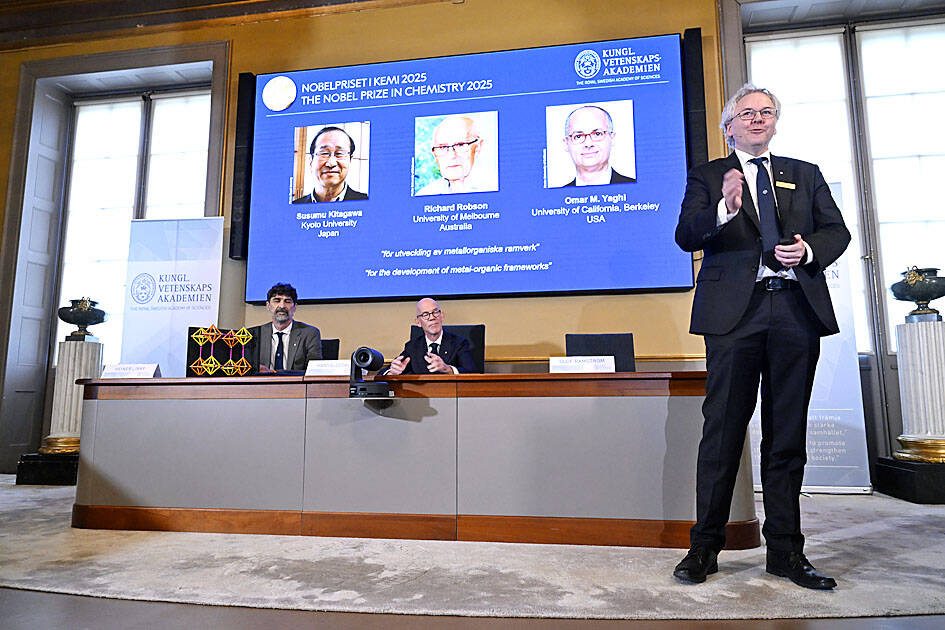Scientists Susumu Kitagawa, Richard Robson and Omar Yaghi yesterday won the Nobel Prize in Chemistry for developing a new form of molecular architecture, yielding materials that can help tackle challenges such as climate change and lack of fresh water.
The laureates worked to create molecular constructions, known as metal-organic frameworks (MOFs), with large spaces through which gases and other chemicals can flow and that can be utilized to harvest water from desert air, capture carbon dioxide or store toxic gases.
Describing the “unheard of properties” of the materials, the award committee said some had a remarkably large surface area — a porous material about the size of a small sugar cube could contain as much surface area as a large soccer pitch.

Photo: EPA
“A small amount of such material can be almost like Hermione’s handbag in Harry Potter. It can store huge amounts of gas in a tiny volume,” Nobel Committee for Chemistry member Olof Ramstrom said.
The more than century-old prize is awarded by the Royal Swedish Academy of Sciences and the winners share 11 million kronor (US$1.2 million), as well as the fame of winning arguably the world’s most prestigious science award.
Kitagawa told the Nobel news conference that he was deeply honored by the award.
“My dream is to capture air and separate air to — for instance, in CO2 or oxygen or water or something — and convert this to useful materials using renewable energy,” he said.
After the discoveries, chemists have built tens of thousands of different MOFs, some of which “may contribute to solving some of humankind’s greatest challenges,” the academy said, adding that additional uses included separating toxic polyfluorinated alkyl substances, or “forever chemicals,” from water and breaking down traces of pharmaceuticals in the environment.
Kitagawa is Japanese, Robson was born in the UK, but moved to Australia in his late 20s, while Yaghi is Jordanian-American.

A Ministry of Foreign Affairs official yesterday said that a delegation that visited China for an APEC meeting did not receive any kind of treatment that downgraded Taiwan’s sovereignty. Department of International Organizations Director-General Jonathan Sun (孫儉元) said that he and a group of ministry officials visited Shenzhen, China, to attend the APEC Informal Senior Officials’ Meeting last month. The trip went “smoothly and safely” for all Taiwanese delegates, as the Chinese side arranged the trip in accordance with long-standing practices, Sun said at the ministry’s weekly briefing. The Taiwanese group did not encounter any political suppression, he said. Sun made the remarks when

The Taiwanese passport ranked 33rd in a global listing of passports by convenience this month, rising three places from last month’s ranking, but matching its position in January last year. The Henley Passport Index, an international ranking of passports by the number of designations its holder can travel to without a visa, showed that the Taiwan passport enables holders to travel to 139 countries and territories without a visa. Singapore’s passport was ranked the most powerful with visa-free access to 192 destinations out of 227, according to the index published on Tuesday by UK-based migration investment consultancy firm Henley and Partners. Japan’s and

BROAD AGREEMENT: The two are nearing a trade deal to reduce Taiwan’s tariff to 15% and a commitment for TSMC to build five more fabs, a ‘New York Times’ report said Taiwan and the US have reached a broad consensus on a trade deal, the Executive Yuan’s Office of Trade Negotiations said yesterday, after a report said that Washington is set to reduce Taiwan’s tariff rate to 15 percent. The New York Times on Monday reported that the two nations are nearing a trade deal to reduce Taiwan’s tariff rate to 15 percent and commit Taiwan Semiconductor Manufacturing Co (TSMC, 台積電) to building at least five more facilities in the US. “The agreement, which has been under negotiation for months, is being legally scrubbed and could be announced this month,” the paper said,

Japan and the Philippines yesterday signed a defense pact that would allow the tax-free provision of ammunition, fuel, food and other necessities when their forces stage joint training to boost deterrence against China’s growing aggression in the region and to bolster their preparation for natural disasters. Japan has faced increasing political, trade and security tensions with China, which was angered by Japanese Prime Minister Sanae Takaichi’s remark that a Chinese attack on Taiwan would be a survival-threatening situation for Japan, triggering a military response. Japan and the Philippines have also had separate territorial conflicts with Beijing in the East and South China